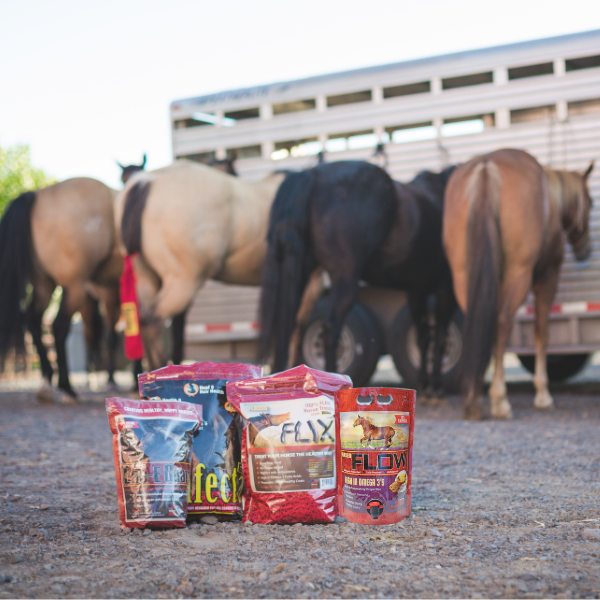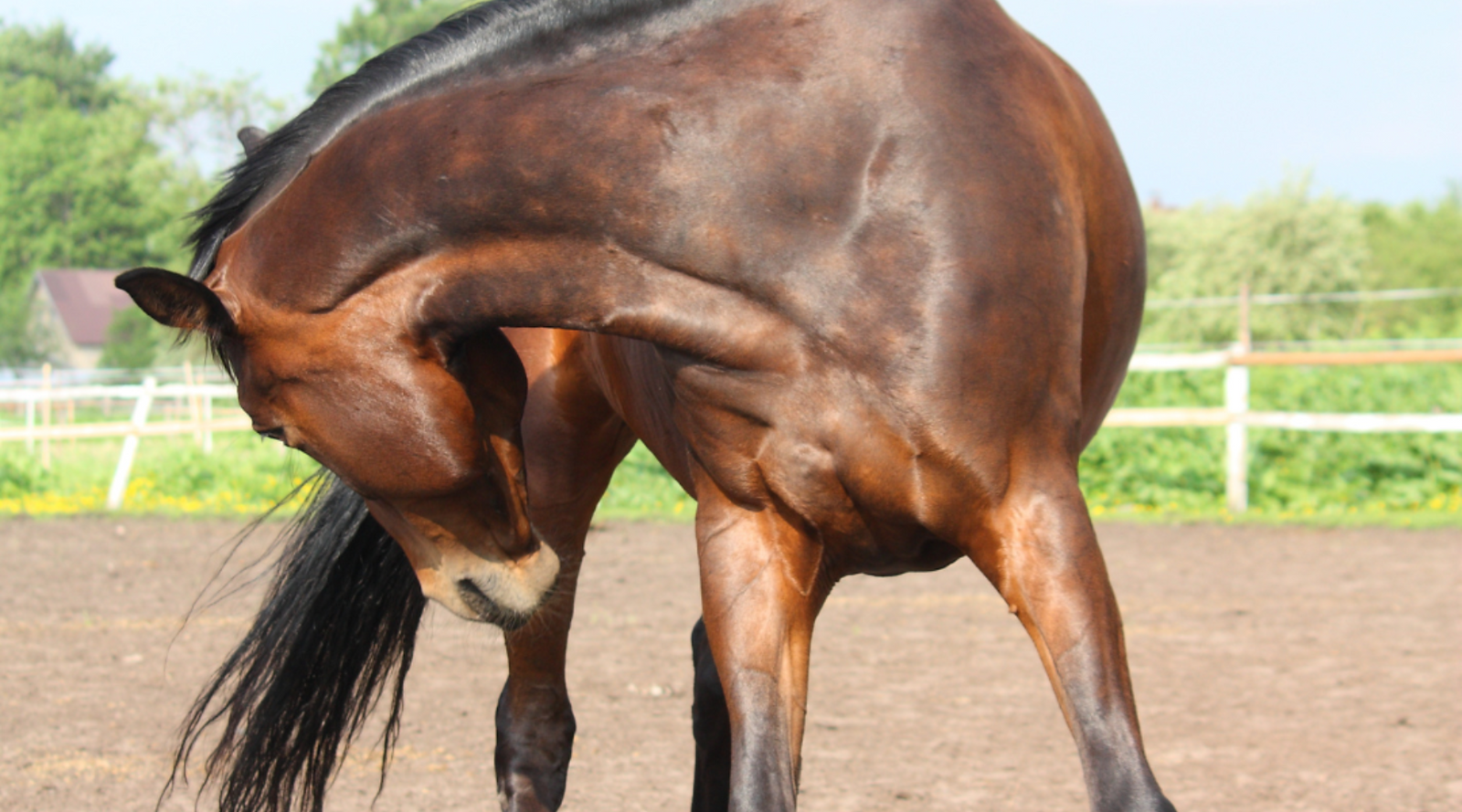Allergies in horses can develop at any time for a number of reasons. These allergies can significantly impact their health and well-being, affecting their performance, behavior and overall quality of life. Seasonal allergies for horses are a lot like humans and tend to be most common in the Spring and Summer months from a range of irritants like pollen, insects, and environmental conditions like dust.
Allergies are immune disorders caused by complex interactions of genetic as well as environmental factors and primarily affect the immune, respiratory, and integumentary (skin) systems. The body’s largest organ, the skin serves as the immune system’s first protective barrier making it a common site for the body’s expression of allergic reactions.
Common seasonal allergies in horses
Skin Allergies and Insect Bite Hypersensitivity in horsesThe most common type of seasonal allergies in horses is skin allergies which can develop as a result of exposure to anything your horse may come into contact with such as pollen, dust, mold, fly spray and insects. Skin allergies present as skin irritation with associated hair loss, hives and rashes. If left untreated these conditions can not only cause discomfort but also lead to raw broken skin that allows bacteria to invade and cause an infection. The most common skin allergy in horses is Insect Bite Hypersensitivity. In these cases the horse has an allergic reaction to the saliva of insects especially from flies and mosquitoes. In severe cases, insect bites can cause anaphylactic shock, a life-threatening allergic reaction. Sweet itch is a common dermatological ailment of horses caused by a type-1 hypersensitivity reaction to the insect bite from theCulicoides and is characterized by itchy lesions along the ventral midline, dorsal midline, mane, and tail.
Respiratory Allergies in HorsesPollen from grasses, trees, and weeds can trigger allergic reactions in horses, especially in the spring and summer months when pollen levels are high. Horses can inhale pollen particles which can irritate their respiratory system causing symptoms such as coughing, wheezing, and nasal discharge.
Dust from hay, bedding, or stable environments can also irritate your horse’s respiratory system.
The Role of feeding Flaxseed as a supplement to help Seasonal Allergies in horses

Flaxseed is a rich source of essential fatty acids which must be obtained in the diet because they cannot be synthesized by the horse’s body. Most of the fat in flaxseed is in the form of two polyunsaturated fatty acids: Linoleic acid (LA) and Alpha-linolenic acid (ALA).
ALA naturally exists in fresh pasture grass, however, it is quickly depleted in hay. Horses that are fed a hay-based diet will consume significantly less omega-3 fatty acids than horses that have consistent access to quality pasture grasses. Once hay has been cut, cured and baled there is a rapid decline in the concentration of omega-3 fatty acids.
Inflammation is known to play a significant role in the response to allergies and the Omega-3’s found in Flaxseed have anti-inflammatory properties that can help reduce allergy symptoms in horses.
Omega-3 fatty acids promote the formation of a healthy skin barrier reducing dry, flaky skin and itching and improving the condition of your horse’s skin and coat. Omega-3's also strengthen the immune system with the nutrients in flaxseed such as Vitamin E having antioxidant properties that help decrease oxidative damage in tissues, supporting your horse’s immune system and boosts its defenses.
Researchers O’Neill et al., 2002 conducted a study that supplemented horses with one pound of ground flaxseed per 1000 lb of body weight for 42 days and found the horse’s skin showed reduced sensitivity to allergens. Supplementing Omega-3 for horses with allergies is one of the best ways you can combat common allergies in horses, especially skin allergies.
Additional Health Benefits of Flaxseed

Flaxseed offers additional health benefits for your horse which include:
- Joint Health: Omega-3 fatty acids have an anti-inflammatory effect and can contribute to joint health, alleviating joint discomfort.
- Strengthening the immune system: nutrients in flaxseed such as Vitamin E, have antioxidant properties that supports your horse’s immune system
- Supporting metabolism: oil is essential for many metabolic processes in your horse’s body, therefore flaxseed oil can positively impact metabolism.
- Ease breathing issues
- Supports thyroid function
- Aids in glucose metabolism
- Promotes circulation and vascular health
- Supports hoof health
- Aids in gastrointestinal function
Other Prevention Strategies Against Insect Bites:
- Use a fly spray.
- Try a barrier technique such as a fly sheet with neck, belly, and tail coverage and a fine mesh fly mask.
- Minimize standing water which is where midges live and breed. If possible to keep horses away from ponds and marches and clean water tanks often.
- Stable horses during times of the day when midge activity is high, such as in the hours around dawn and dusk.
- Provide ceiling or stall box fans. Midges are weak flyers and circulating air can prevent them from landing.
- Clean manure often and keep manure piles as far away from horses as possible.
Horse Guard offers a great line up of Flaxseed products
Flaxen Flow is 100% flaxseed oil which is stabilized, unfiltered, cold-pressed, and nitrogen-protected to ensure maximum potency and effectiveness. It provides the highest level of omega-3 fatty acids per ounce. Flaxen Flow is the purest and most highly concentrated omega-3 supplement for horses.
Flaxen Flix Treats are a healthy treat made of 100% flaxseed cake, with no added sugars.
Flaxen Eas-E Guard has the bases of a 100% flaxseed base with 1000 IU of vitamin E per scoop and is formulated to help horses combat oxidative stress, boost immunity, and optimize muscle and nerve function. This amazing supplement contains powerful antioxidants that protect the horse's body from harmful free radicals that can cause stress. The natural vitamin E is carried in the beneficial base of flaxseed cake, which provides an additional benefit of anti-inflammatory properties from omega-3 fatty acids.
Flaxen Flex Guard is a great joint supplement to help ease the pain and slow the progression of arthritis. With the combination of the flaxseed cake, glucosamine, MSM, HA, chondroitin, and antioxidants it can help put your horse at ease.
Flaxen Glow is the ultimate high-protein, high-fat supplement made with a blend of 50% flaxseed cake and 50% full-fat extruded soybeans. It helps promote healthy skin and coat while also boosting energy and adding vital protein to your horse’s diet.
Conclusion
A balanced diet is vital for maintaining overall health and the best defense against seasonal allergies in horses. Although, horses have a very limited diet usually consisting of hay, alfalfa, and water. The nutrition coming from the common feedstuffs lacks vital nutrients, vitamins and nutrients, like omega-3 fatty acids that can dramatically help your horse fight the allergies discussed in this article. The Horse Guard products listed above are your best defense against many of the common issues that horses experience from allergies.






Leave a comment (all fields required)